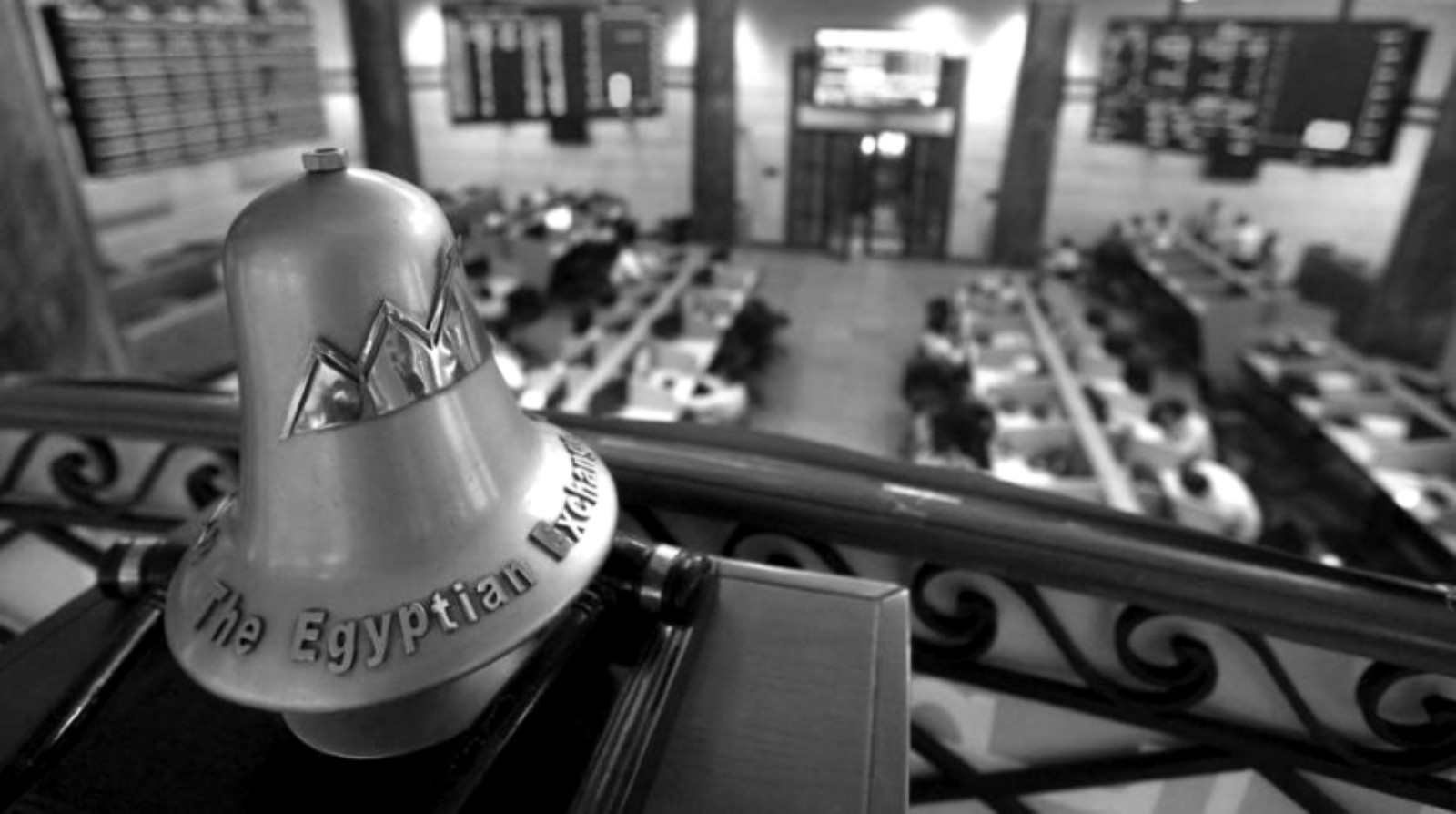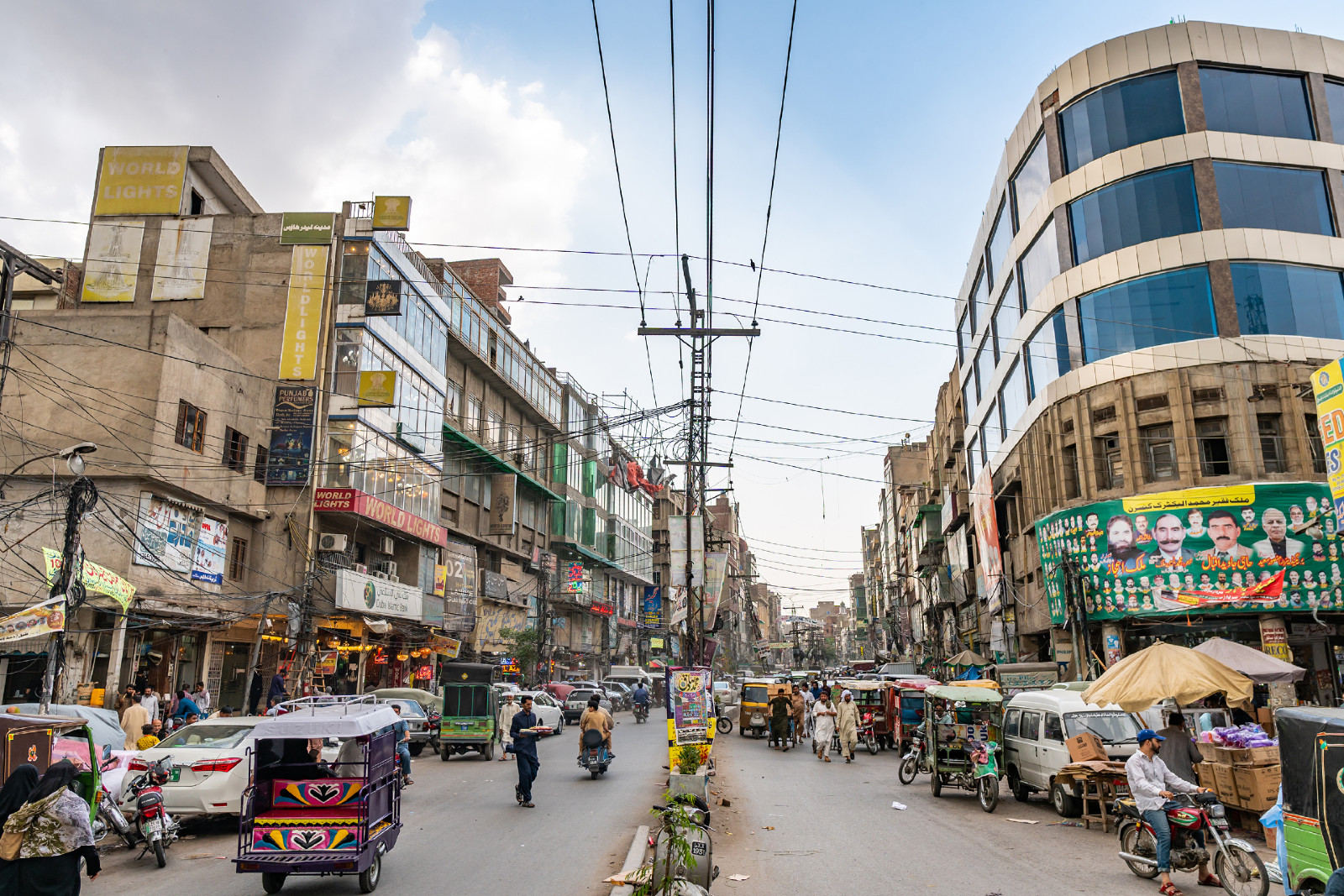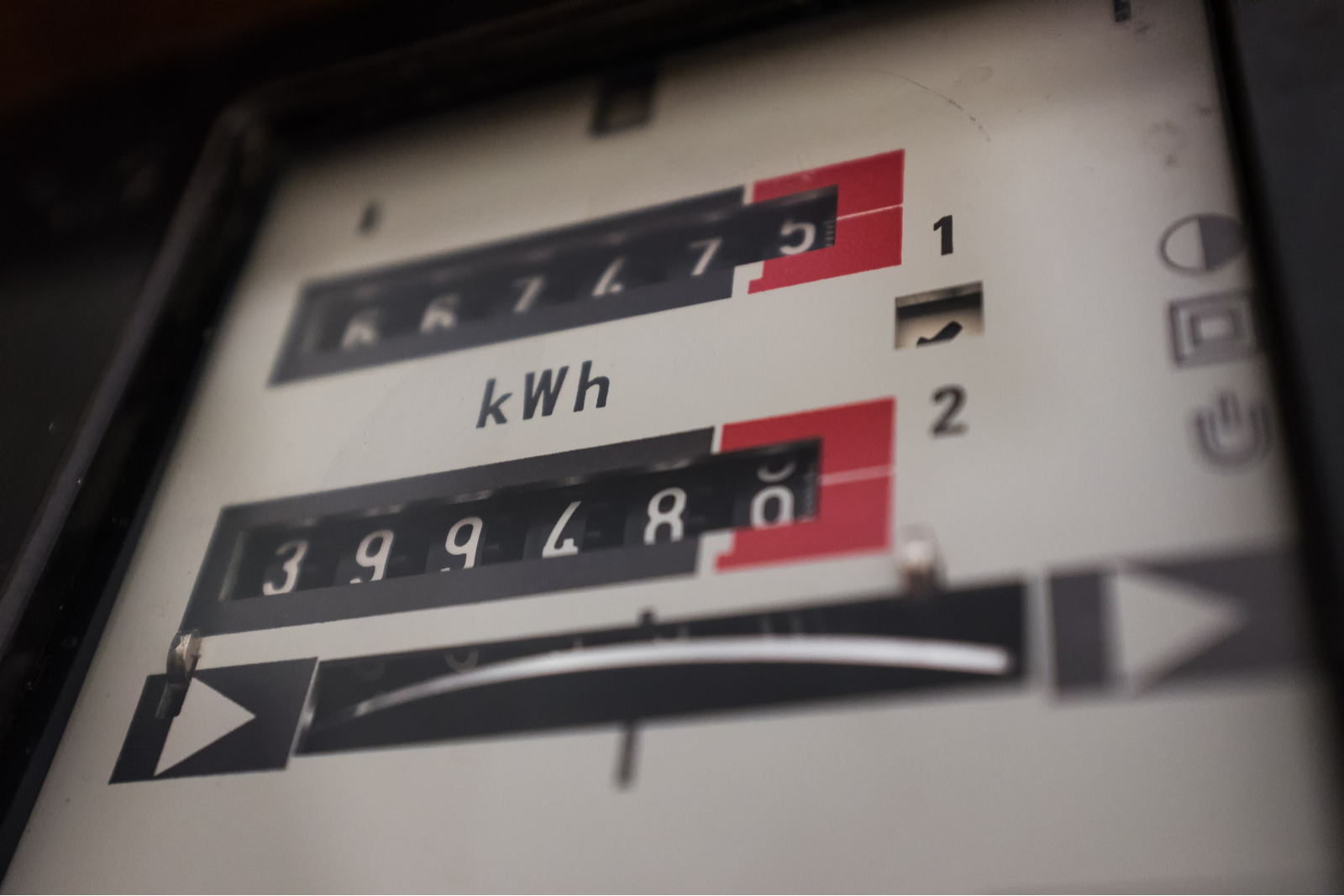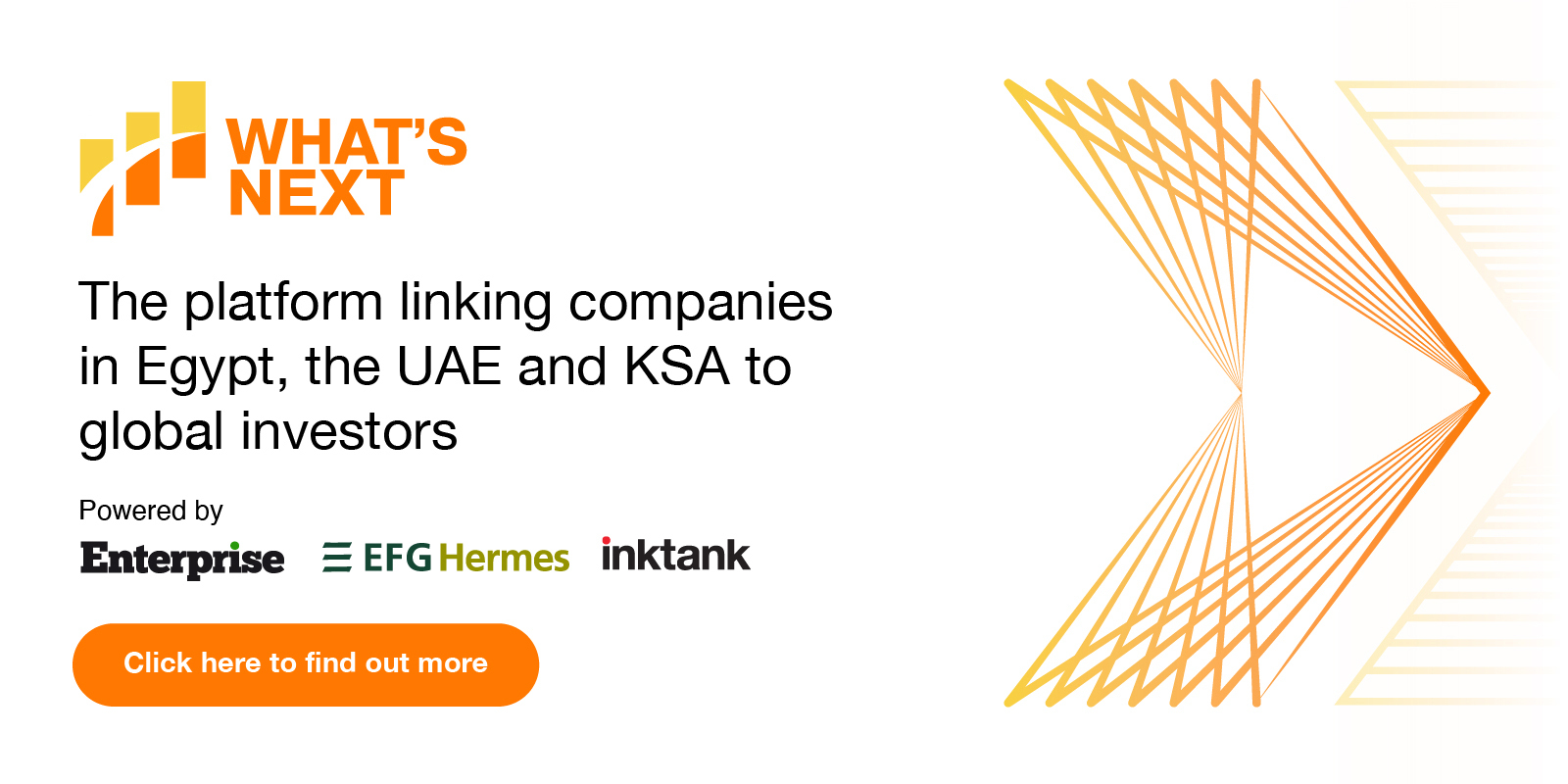- Abu Dhabi’s sovereign fund makes good on its pledge with USD 1.8 bn of stake purchases in EGX-listed firms + launches MENA’s first SPAC. (M&A Watch)
- Local fintech startup Paymob has officially expanded to Pakistan. (Startup Watch)
- Smart water and electricity metering startup Pylon raises USD 19 mn seed round. (Startup Watch)
- The Tax Authority will start trials of its B2C e-invoicing system for 100 big firms on Friday. (Tax)
- An individual investor acquired 7.5% of Sinai Cement amid Vicat’s settlement of an ownership dispute. (M&A Watch)
- Cabinet has approved a draft law criminalizing child marriage. (Cabinet Watch)
- Google Maps can struggle to keep up with all the changes to Cairo’s roads — why? (Hardhat)
- DEWA shares soared on their debut, putting Dubai firmly on the global listings map + Actis buys 50% of Emicool from Dubai Investment. (Planet Finance)

Wednesday, 13 April 2022
AM — ADQ enters the EGX in a big way with USD 1.8 bn buy
TL;DR
WHAT WE’RE TRACKING TODAY
Welcome, friends from Abu Dhabi.
IT’S A BIG DAY FOR the private sector after Abu Dhabi wealth fund ADQ bought stakes yesterday in bold-name EGX-listed companies including CIB and fintech player Fawry in a series of block trades on the Egyptian Exchange. ADQ has previously invested in our friends at SODIC (alongside Aldar) and other household names here. ADQ deployed some USD 1.8 bn here yesterday.
ADQ’s rapid scaling up of its investments in Egypt comes as part of a drive by our GCC allies to help us sort through the fallout from Russia’s war in Ukraine, which has sent commodity prices skyrocketing, nuked the high-volume Red Sea tourism market, and upended the global wheat market upon which we depend.
We like Abu Dhabi’s strategy: Separately, Emirati lender FAB is pursuing a majority stake in our friends at EFG Hermes, the premier financial services corporation in frontier emerging markets, and Alpha Dhabi (which already has exposure to Egypt through its stake in Aldar) is looking at how to get more exposure to Egypt. And now there’s chatter in the market that another arm of ADQ is looking to buy a stake in a brandname consumer foods company.
We don’t know ADQ (or FAB), but we know how they and other Emirati investors operate from talks over the years with our friends who do business with them: They’re investors who put an emphasis on good governance, crisp management, aggressive growth targets, and no BS. More of this, please.
We have more on ADQ’s big day in the news well, below.
WATCH THIS SPACE- We’re getting an economic recovery task force to steer us through the storm whipped up by war in Europe. Prime Minister Mostafa Madbouly directed the ministerial economic committee (which includes cabinet ministers, CBE deputy governors, and the head of investment body GAFI) to form a task force to develop a strategy for the economic recovery from the repercussions of the ongoing war on Ukraine, according to a statement.
MEANWHILE- EgyptAir will resume direct flights between Cairo and Moscow on Friday, 15 April, according to a statement from the national flag carrier, which said it would run one flight per day between the two cities. MPs last week approved a draft law allowing the Finance Ministry to ins. EgyptAir against potential losses on flights to and from Russia, which were suspended in March due to the war.
Flights to Moscow are restarting a couple days later than planned: Online booking had previously been available for flights starting yesterday. The airline is asking customers whose earlier bookings to Moscow were canceled to call its 1717 customer service line.
DATA POINT- Investors have now poured some EGP 523 bn into 18% CDs at Banque Misr and the National Bank of Egypt. Nearly 70% went to the NBE, while the remainder went to Banque Misr, Hapi Journal reported here and here. The CDs launched three weeks ago, following the central bank’s 100-bps interest rate hike.
AND- The Pharaohs have a new coach: Former football player Ehab Galal has been appointed the new coach of the men’s national football team, succeeding Carlos Queiroz, who stepped down from his position by mutual agreement earlier this week, the Egyptian Football Association (EFA) announced yesterday. Galal was in the running lead the team back in 2019 but the EFA went with Hossam El Badry instead. The EFA also dismissed its technical manager, Nelo Vingada.
KUDOS (Pt II): We took note yesterday of the CEOs of Egyptian companies that made Forbes Middle East Top 50 Healthcare Leaders for 2022. Other Egyptian CEOs on the list heading companies domiciled outside Egypt included:
- 21- Julphar CEO Essam Mohamed
- 24- Eva Pharma CEO Riad Armanios
- 25- Jamjoom Pharma CEO Tarek Hosni
- 32- American Hospital Dubai CEO Sherif Beshara
- 37- Viatris head of Middle East, Turkey and Levant Ayman Mokhtar.
SO, WHEN DO WE EAT? You’ll be breaking your fast at 6:21 pm CLT this evening in the capital city, and fajr prayers are at 4:00am.
|
THE BIG STORY ABROAD- Other than the latest in the war in Ukraine (see just below) and the reaction to a new 40-year high for US inflation (scroll on a little further), the international press is taking note of an attack on the New York subway system yesterday in which at least 10 people were shot. AP has the details.
WAR WATCH- A packed day of news on the home front means your daily update on Russia’s war in Ukraine comes in bullet-point form this morning. Here’s what you need to know:
- Putin calls time on peace talks: Russian President Vladimir Putin said that peace talks with Ukraine are “at a dead end” and vowed to continue the invasion of Ukraine, Bloomberg reports. Ukraine accused Russia of sabotaging the negotiations.
- Biden accuses Putin of genocide: The war of words saw a significant escalation when the US president for the first time accused Russia of genocide in Ukraine. (Bloomberg)
- The Biden administration will send Kyiv USD 750 mn in military aid (Reuters).
- The Ukrainian government and some of its Western allies are investigating allegations Russia may have used a chemical weapon in the besieged eastern Ukrainian city of Mariupol. (New York Times)
- The World Bank is lending Ukraine USD 1.5 bn — USD 1 bn of which comes from the lender’s fund for poor countries. (Reuters)
MARKET WATCH-
US inflation reaches new 40-year high as Ukraine war hits home: Inflation in the US surged to 8.5% in March, its highest level since December 1981, data by the Bureau of Labor Statistics showed yesterday. Food and rent prices saw particularly large jumps during the month, while the cost of gasoline accounted for more than half of all the items’ monthly increase, rising 18.3%. Inflation is being driven by both significant grow as the US economy bounces back from covid, the Wall Street Journal reports, as well as by sharp rises in oil and commodities prices on the back of the war in Ukraine.
This is (slightly) above expectations: Analysts expected the CPI to come in at 8.4%.
Markets didn’t quite know what to make of it: US stocks closed marginally down, paring gains earlier in the day as traders wagered that price pressures could have reached their peak, Bloomberg reports. Rising commodity prices — including all important oil — seemed to put paid to those hopes, with international benchmark Brent crude climbing to trade near USD 105 in the early hours of this morning.
Markets are now looking to earnings releases from big banks — which will start coming in today — for their next cue on the impacts of inflation, as we noted yesterday.
COVID WATCH- iPhone maker halts production in Shanghai due to worst Covid outbreak in two years: Apple iPhone assembler Pegatron has halted production at two of its plants in China due to the strict stay-at-home measures in force in Shanghai to counter a covid outbreak, Bloomberg reports. This is major, fellow iSheep: Pegatron assembles around 20-30% of all iPhones.
There might be some light at the end of the tunnel: Authorities are beginning to lift some restrictions on neighborhoods where no new infections have been reported, after food shortages caused public outroar, the Associated Press reports.
CIRCLE YOUR CALENDAR-
Companies have one week left to file their first quarterly ESG compliance report: Listed firms and non-bank financial services companies need to submit their first quarterly ESG report by 20 April, the Financial Regulatory Authority (FRA) announced last week. The regulator is making it mandatory for corporates to publicly disclose their performance on key environmental, social and governance metrics each year when they submit their annual financial statements, starting 2023.
Reach out to Moustafa Taalab at InkankIR, our parent company, if you need some help.
Check out our full calendar on the web for a comprehensive listing of upcoming news events, national holidays and news triggers.

*** It’s Hardhat day — your weekly briefing of all things infrastructure in Egypt: Enterprise’s industry vertical focuses each Wednesday on infrastructure, covering everything from energy, water, transportation, and urban development, as well as social infrastructure such as health and education.
In today’s issue: If you’ve found yourself lost driving on a new bridge lately, desperately trying to get a hint from your phone on where it leads or when you’ll reach the next exit, you’re not alone. Cairo’s roadmaps are changing at speed thanks to the government’s infrastructure push — and Google Maps sometimes finds it hard to keep up. In this week’s Hardhat, we try to shed light on how the platform functions and why Cairo traffic routes can send it into a tailspin.
M&A WATCH
ADQ makes grand entry into the EGX with USD 1.8 bn buy + launches first MENA SPAC with Chimera

Abu Dhabi wealth fund ADQ acquired state-owned stakes in five EGX-listed companies yesterday as part of an agreement reached last month to provide Egypt with emergency liquidity as we grapple with fallout from Russia’s war in Ukraine.
The fund purchased shares in CIB, Fawry, Abu Qir Fertilizers, Mopco, and Alexandria Container & Cargo Handling for around USD 1.8 bn, according to EGX data yesterday. The bourse didn’t name the buyer, but as we noted last month, the government had agreed to sell stakes in each of these five companies to ADQ as part of an investment package worth up to USD 2 bn.
The breakdown (by our math):
- CIB: A 17.15% stake in the leading private sector bank was sold for USD 911.5 mn, at an average price of USD 2.68 per share.
- Abu Qir: A 21.5% stake owned by the National Investment Bank was sold for USD 391.9 mn, at an average price of USD 1.44 per share.
- Mopco: A 20% stake in Mopco was sold for USD 266.6 mn, at an average price of USD 5.82 per share.
- Alex Containers: A 32% stake in Alexandria Container & Cargo Handling was sold for USD 186.1 mn, at an average price of USD 0.39 per share.
- Fawry: An 11.8% stake in fintech player Fawry was sold for USD 54.9 mn, at an average price of USD 0.27 per share.
Shares rose on the news: Fawry saw the biggest gain during trading yesterday, closing the session up 4.9% at EGP 4.94 per share. Meanwhile, Abu Qir rose 3.6%, to close at EGP 24.75, Mopco gained 2.5% (closing at EGP 97.30) and CIB rose almost 2% to end the session at EGP 44.00. The outlier was Alex Containers, which fell 1.4%, closing the day at EGP 7.60.
Who were the sellers? NBE and Banque Misr were the sellers of stakes in both CIB and Fawry, Al Borsa reports, citing unnamed sources. The Finance Ministry sold ADQ a 20% stake in Mopco, reducing the size of FinMin’s stake to 6%, the local outlet says. National Investment Bank reportedly made a complete exit from Abu Qir through its stake sale. And the Alex Containers stake was reportedly sold to ADQ by Alexandria Port Authority.
What about regulatory approvals? The CIB stake sale received approval from the Central Bank of Egypt (CBE) a few days prior to the transaction, according to Al Borsa. Anyone looking to take a stake of more than 10% in any Egyptian bank requires CBE approval under the Central Bank and Banking Act, and the CBE’s sign-off before taking a board seat and appointing someone to fill that vacancy.
ADQ already has a strong portfolio of Egyptian investments: In 2019, ADQ established a USD 20 bn joint investment fund with the Sovereign Fund of Egypt to channel funds into a variety of industries and assets. The wealth fund has had plenty of appetite for acquisitions in Egyptian companies: Its latest blockbuster transaction was its acquisition of leading real estate developer SODIC alongside Aldar Properties last year. ADQ also acquired 99% of Bausch Health’s local pharma outfit Amoun Pharma, as well as 75% of Atyab brand owner Ismailia Agricultural and Industrial Investments.
Speaking of ADQ: Chief Executive Officer Mohamed Hassan Alsuwaidi joined Aldar’s board of directors earlier this week.
ADQ and Chimera to launch first MENA SPAC listing
It was a huge day for ADQ, which also announced the launch of the first MENA-based SPAC in cooperation with our friends at Chimera. The fund and Chimera’s PE arm yesterday announced the establishment of their SPAC, dubbed ADC Acquisition Corporation, which hopes to raise AED 367 mn (EGP 1.85 bn) through an IPO on the Abu Dhabi exchange. The ADX paved the way for the move when it issued its SPAC regs back in February. The listing is subject to market conditions (which are less than ideal for SPACs right now) and all the usual regulatory approvals.
Abu Dhabi has pipped us to the post for MENA’s first SPAC — but don’t rule out involvement from Egyptian firms. The blank-check firm will look to merge with one or more “fast-growing, technology-driven businesses with strong management teams and attractive valuations” across the MENA region, according to a joint statement. We had expected to see Egypt’s first SPAC established early this year, but we’ve heard nothing on that front recently (unsurprisingly, given that the effects of war in Ukraine have most policymakers in crisis-management mode.)
STARTUP WATCH
Paymob launches in Pakistan

Paymob lands in Pakistan: High-profile Egyptian fintech startup Paymob has officially launched in Pakistan, it announced in a press release (pdf) yesterday. The digital payments provider said it will launch a number of payment services in the country, including payment gateways, POS, SoftPOS, and contactless payments.
Why Pakistan? Paymob said that Pakistan is “perfectly suited” to the company’s strategy due to the low rate of fintech penetration and the country’s high population. Home to more than 220 mn people and more than 4 mn SMEs, there are only 80k POS terminals and less than 3k ecommerce gateways in the South Asian country. Pakistan’s economy is also expected to see strong growth, as is the value of the country’s e-commerce sector, which increased 83% last year to USD 3.9 bn.
Paymob’s entry to Pakistan is also getting mentions in the foreign press: Bloomberg | The National.
STARTUP WATCH
Pylon closes USD 19 mn seed round

Infrastructure management platform Pylon has raised USD 19 mn in a seed funding round led by Endure Capital, Cathexis Ventures, Khwarizmi Ventures, LoftyInc Capital and angel investors, the startup announced in a statement (pdf). The investment includes an unspecified mix of equity and debt and will be used to help the company expand into new markets and develop its product offering.
About the company: Launched in 2017, Pylon provides what it calls “smart metering as a service” to water and electricity distribution companies. It uses data analytics and AI to detect where electricity is being stolen and where losses are happening on the grid, helping distribution companies reduce losses, increase efficiency and improve their revenues.
Where does it operate? The company is currently active in Egypt and the Philippines, according to TechCrunch, and now serves more than 1 mn meters. It works with five of Egypt’s nine distribution companies, serving 500k meters across South Cairo, the South Delta, Alexandria, the canal region, and Middle Egypt, and operates meters in Madinaty and Mostakbal City.
By the numbers: The company has reached profitability less than five years after its launch, and experienced 3.5x growth last year.
Expansion plans: The company is targeting new emerging markets in Southeast Asia, Africa and Latin America, it said.
TAX
E-receipt system pilot to kick off 15 April + official rollout set for 1 July

E-receipt system pilot to kick off 15 April: The Finance Ministry will launch a pilot of its e-receipt system for business-to-consumer (B2C) transactions this Friday, 15 April, it said in a statement yesterday. The trial period will last for 11 weeks until 1 July when the system will be officially rolled out, it said.
What’s this all about? The taxman wants the ability to track back and validate any sale a retail business makes to a customer. Imagine, for example, a shopper at your Friendly Neighborhood Supermarket buying an EGP 500 basket of goods. With the e-receipt system, the details of the transaction would be captured in real time by the taxman from the point of sale. That would make it impossible for Friendly Neighborhood Supermarket’s owner to hide revenue from the Tax Authority by keeping two sets of books: one with 100% of sales and expenses for his / her own use, and the other for government consumption with, say, 85% of sales and 100% of expenses.
How it works: Sales data controllers will be installed in all payment processing systems used by retailers and wholesalers to monitor and record all tax-relevant transactions. A state contractor — which has not yet been contracted, we’re told — will provide retailers with POS machines and will be responsible for activating and monitoring them and providing technical support. The e-receipts will also be encoded with QR codes that allow tax officials to verify their validity.
Who’s involved: Some 100 taxpayers from a variety of sectors will be involved in the pilot, Mohamed Keshk, who heads an internal audit department at the Tax Authority’s large taxpayers division, told us yesterday. He declined to name names, but did say that two of consumer electronics giant El Araby’s subsidiaries are involved in the program.
E-receipts won’t be issued from the get-go: During the first month of the pilot, sales data controllers will be distributed and retailers will receive training on how to use the system, says Keshk. By mid-May, we can expect to see the first e-receipts being rolled out, he added.
Wasn’t this supposed to start two weeks ago? We had reported that the pilot would kick off on 1 April, but Keshk told us yesterday that the beginning of April marked the end of the authority’s preparations, rather than the start date for the pilot.
What’s the plan for the official rollout? Companies with the largest sales volumes will be the first to be onboarded to the system in July, before it is rolled out to medium and small companies at a later stage, Keshk said. The ministry has not yet settled on a timeline for the full rollout, he added.
The system is being implemented by E-Tax, a subsidiary of EGX-listed fintech player e-Finance.
BACKGROUND: The new system complements the ongoing rollout of the wider e-invoicing program, and — in addition to cracking down on tax evasion — aims to help the Tax Authority reduce the size of the informal economy. It could also shore up consumer rights, since purchasers will no longer have to keep hold of paper receipts if they end up deciding to return items, FinMin has said.
Current state of the e-invoicing rollout: Over 52k companies have so far registered on the system and have sent some 154 mn e-invoices, according to the statement. The system had detected over 17k cases of tax evasion — clawing back more than EGP 6 bn for the treasury — as of the end of 1Q, officials said previously.
Where this came from: The Tax Authority launched a pilot for the B2B e-invoicing program with 134 companies in late 2020, before extending the system to all large taxpayers last July. All B2B invoices issued by businesses based in the Greater Cairo Area will be automated by June, director of taxpayer services at the Tax Authority Mohsen El Gayar recently told Enterprise, while all B2B and B2C invoices across the country should be fully automated by December.
M&A WATCH
Investor acquired 7.5% of Sinai Cement in March

Investor acquired 7.5% of Sinai Cement amid Vicat dispute settlement: The settlement of the dispute between Sinai Cement’s parent company and the Egyptian government paved the way for an investor to acquire a 7.5% stake in the firm, four years after the purchase took place, Enterprise has learned. The 10 mn shares bought by Asmaa Amer Gharib back in 2018 were frozen after the government allegedly tried to force the French cement producer Vicat to sell its majority stake, and were only unfrozen last month when the two sides settled the ownership dispute. No details on the settlement were publicly disclosed.
The details: Gharib acquired 9.98 mn shares of Sinai Cement on 20 March at an average price of EGP 10 each, according to an EGX disclosure (pdf) filed Monday. Vicat and the government signed the settlement agreement a day later. Gharib has no public profile that we can ascertain.
Vicat is now mounting a takeover bid: A mandatory tender offer submitted by Vicat for another 42.1% of Sinai Cement at EGP 6.74 per share got underway on Sunday. The subscription period will finish on 21 April. Vicat owned some 56.2% of Sinai Cement as of the end of 2021, according to the company’s latest financials.
CABINET WATCH
Draft bill criminalizing child marriage approved by cabinet

We could finally get a law that criminalizes child marriage: The cabinet has approved a draft bill that would, if passed, criminalize child marriage and hand out jail terms and fines for people found guilty of violating the act, it said in a statement following its weekly meeting yesterday. ِIn the first legislation of its kind, the bill would prohibit marriage of anyone under the age of 18 and require marriage officiants to notify prosecutors of any common-law marriage — also known in Arabic as orfi marriage — that involves a child.
Violators of the law are subject to jail terms + fines: Those who marry or are involved in the marriage of a child under 18 will face at least one year in jail and a fine of EGP 50k-200k. Family courts could remove guardianship of children in cases where family members are convicted. The same penalties would be imposed against those encouraging child marriage, the statement said, adding that children involved would not be held accountable. Marriage officiants who fail to inform the prosecution would receive a minimum six months in jail and an EGP 20k-50k fine.
Stats on child marriage in Egypt are hard to come by: One of the most recent was in 2017 when state statistics agency Capmas said that more than 117k children under 17 are married each year. The Cairo-based Forum for Development and Human Rights Dialogue argues that the real number could be three times higher.
What’s next for the bill: The usual, we presume — the bill will make its way on to the House of Representatives for debate and amendments.
ALSO FROM THE MEETING-
More infrastructure ahead of COP 27. Cabinet has approved extending the validity of renovation permits for several hotel projects in Sharm El Sheikh and Nabq until the beginning of October. The extension would allow resorts to continue renovating existing facilities ahead of the COP 27 summit in November. Some hotels are being converted to run on solar power ahead of the conference.
LAST NIGHT’S TALK SHOWS
The Ramadan lull continues: Next to nothing was happening on the airwaves last night, except for Agriculture Minister El Sayed El Quseir reassuring Ala Mas’ouleety’s Ahmed Moussa that the state can fulfill citizens’ food supply needs and at low prices (watch, runtime: 6:07).
Where have our talking heads gone? Ramadan has put them into a month-long hibernation. We haven't seen Kelma Akhira’s Lamees El Hadidi since the holy month kicked off almost two weeks ago, while Masaa DMC and Al Hayah Al Youm have also been absent from their respective YouTube channels. Talkshows typically go on hiatus during the holy month.
EGYPT IN THE NEWS
Human rights is again leading coverage of Egypt in the international press: The state-backed National Council for Human Rights (NCHR) is tracking prosecutors’ work to look into the death of economics researcher Ayman Hadhoud. Hadhoud died in early March at Abbasiya Mental Health Hospital after reportedly being detained by government agents a month earlier. Both Reuters and The Independent have the story.
Also making headlines:
- Israel’s climate envoy wants tech solutions prioritized at COP 27, saying the “time for describing the problems is over.” (The Times of Israel)
- If an Egyptian Cannot Speak English: A novel by Egyptian-American Noor Naga gets some ink. (New York Times)
ALSO ON OUR RADAR
Fancy a trip to Bulgaria? It’s now sans-covid paperwork. Starting today travelers arriving to Bulgaria from Egypt no longer have to show any coronavirus-related documents, including proof of vaccination. The move also applies to travelers coming from Turkey, Israel, and a handful of Bulgaria’s neighbors in eastern Europe — and to NATO troops arriving in Bulgaria amid the war in Ukraine. (Statement)
Other things we’re keeping an eye on this morning:
- The Financial Regulatory Authority has joined the Organisation for Economic Cooperation and Development’s International Network on Financial Education, an initiative launched in 2002 to improve financial literacy. (Statement)
- The Planning Ministry and MIT’s Abdul Latif Jameel Poverty Action Lab (J-PAL) have launched the Egypt Impact Lab, which will work to connect academics and government partners to strengthen our poverty alleviation policies. (Press Release)
PLANET FINANCE
DEWA shares surge on debut: The Dubai Electricity and Water Authority’s (DEWA) shares jumped as much as 23% on their trading debut in Dubai yesterday following the company’s USD 1.6 bn IPO. The company reached a session high of AED 3.05 before paring gains to close at AED 2.87, up 15.7% from its AED 2.48 opening price. The sale was the world’s second-largest IPO this year and was the biggest in the EMEA region since Saudi Aramco’s USD 30 bn listing in 2019 — and puts Dubai firmly on the IPO map, making it the world’s fifth destination for listings by size, Bloomberg notes. Our friends at EFG Hermes provided financial advice on the transaction, the bank said in a statement (pdf) yesterday.
Actis has acquired a 50% stake in Emirates District Cooling Company (Emicool) from Dubai Investments, according to a joint press release out yesterday. The sale valued the company at USD 1 bn — making it one of the largest district cooling transactions in MENA, according to the release — and creates a 50 / 50 joint venture. Synergy Consulting acted as the sole financial advisor to Actis. Al Mal Capital, a subsidiary of Dubai Investments, was the sole financial advisor to its parent company.
In other global financial news:
- Adnoc increases LNG tankers amid global shortage: Abu Dhabi National Oil Co.’s shipping unit is buying two new liquefied natural gas tankers from China, as it looks to increase its output amid a supply shortage. (Bloomberg)
- Surprise: The price of shipping oil from Russia has soared. The cost of shipping crude to Europe from Russian ports is its highest since 2008, as the majority of tankers steer clear in a bid to avoid sanction-busting. The squeeze on shipping means Russian oil is trading at a steep discount to international benchmarks. (Bloomberg)
|
|
EGX30 |
10,899 |
+1.6% (YTD: -8.8%) |
|
|
USD (CBE) |
Buy 18.45 |
Sell 18.55 |
|
|
USD at CIB |
Buy 18.45 |
Sell 18.55 |
|
|
Interest rates CBE |
9.25% deposit |
10.25% lending |
|
|
Tadawul |
13,646 |
+1.2% (YTD: +21.0%) |
|
|
ADX |
10,102 |
-0.6% (YTD: +19.0%) |
|
|
DFM |
3,569 |
-0.5% (YTD: +11.7%) |
|
|
S&P 500 |
4,397 |
-0.3% (YTD: -7.7%) |
|
|
FTSE 100 |
7,577 |
-0.6% (YTD: +2.6%) |
|
|
Euro Stoxx 50 |
3,831 |
-0.2% (YTD: -10.9%) |
|
|
Brent crude |
USD 104.64 |
+6.3% |
|
|
Natural gas (Nymex) |
USD 6.71 |
+0.4% |
|
|
Gold |
USD 1,969 |
-0.4% |
|
|
BTC |
USD 39,671 |
+0.6% (as of midnight) |
THE CLOSING BELL-
The EGX30 rose 1.6% at yesterday’s close on turnover of EGP 831 mn (13.8% below the 90-day average). Regional investors were net buyers. The index is down 8.8% YTD.
In the green: CIRA (+9.0%), Fawry (+4.9%) and Ibnsina Pharma (+4.4%).
In the red: ADIB Egypt (-4.2%), Eastern Company (-2.6%) and Rameda (-1.9%).
Asian markets are a mixed bag in early trading this morning — and futures suggest Wall Street could fare better than Europe when markets open later today. Japan and South Korea’s exchanges are in the green as of dispatch, while China’s Hang Seng and Shanghai indices look less healthy as the impact of a major covid outbreak in the country continues to make itself felt. Wall Street, meanwhile, is set to open in the green later today — unlike most major European exchanges, which look set to start the day down.


Been led down an odd road and wondered why Google Maps is in the throes of a meltdown? There might be a reason for that. With all construction work taking place on the country’s roads and bridges in recent months (hello, Ring Road), you may have found that some traditional routes hard-wired into your muscle memory were rerouted overnight. Although we might be lucky enough to live in an era where personal navigation tools like Google Maps are easily accessible solutions, you might still find yourself being led astray as apps struggle to keep pace with rapidly changing traffic routes in the city. There’s no definitive answer as to why Google Maps sometimes goes haywire when guiding you through newly constructed or temporarily rerouted roads, but how the platform actually functions provides us with a rough idea.
The backbone of Google Maps’ capabilities is its users: Google relies on about 20 mn pieces of information generated daily (or about 200 contributions per second) from people using Maps as they commute from location to location around the world. Monthly estimates indicate that the company relies on over a bn individual users every month and some 5 mn apps and websites to help power their global mapping system. This means that real time data about things like traffic and route closures are reported back to Google, which uses that information to automatically update its maps.
But there’s room for what the company calls “authoritative data sources” to contribute important information as well: Organizations and government entities like United States Geological Survey, the National Institute of Statistics and Geography (INEGI) in Mexico and housing developers can actually submit critical information for Google to incorporate into their maps. These third party entities, which the company claims are over 1k, can provide information like older maps, street names and plans for new roads to supplement user- generated data.
Businesses also have a hand in shaping Google’s overview of the world: Private businesses who voluntarily submit information about their geographic location have also helped contribute to Google’s repertoire of the some 150 mn places around the world they have registered in their data sets.
Then there’s satellite imagery that helps them construct a bigger picture of what’s going on on the ground: Images produced by satellites in Earth’s orbit are admittedly a little slower than the location data the company receives from its users and third party cooperators but they are a helpful line of defense in mapping out buildings and new roads when little user generated data exists.
And of course Google Maps’ street view cyborg lends a helping hand: Things can get pretty messy in much of the world where roads are narrow and buildings are packed tight. That’s when the company deploys its “Street View 3 wheelers,” which are essentially glorified tuk-tuks strapped with lots of cameras to take pictures of roads, buildings, and signage that feed back into its navigational software. Even on well-paved roads that are visible from an aerial view, street view vehicles often provide useful information about road signs, building numbers, and business names that satellites and users on their own fail to comprehensively cover.
No formal address? No problem. In hard-to-reach parts of the world where there might be built structures but no neatly designated addresses, Google Maps actually develops a stand-in known as Plus Codes. These are unique identifiers of homes based on thousands of images produced by satellites and street view images.
If you’re using Google Maps to navigate through Cairo, chances are you’ve had at least one experience where the app was totally off: Even though the company claims to have all these tools at its disposal to create as accurate a depiction as possible of the real world, there still seems to be some oversights, especially at this moment here in Cairo. Google has admitted some broad shortcomings due to things like tree cover, language, or the pace at which new roads and buildings are constructed contributing to inaccuracies in their maps.
Over the past few years the government has been focused on an infrastructure construction spree: Some of the most significant projects to receive budget allocations in the government’s FY2021-FY2022 budget include some EGP 1.1 bn designated for the development of 350 km of highways (Fayoum-Wahat, Assiut-Sohag-Red Sea, and Suez-Geneifa-Ismailia), and building three new axes — King Salman, Autostrad Fardous, and Matrouh-Siwa — spanning a combined 324 km, at an expected cost of EGP 2.9 bn. Also on the radar has been road work on the 106 km of the Ring Road, which, for many, has been the cause of sudden detours, unanticipated closures and hours of frustration.
It’s still not crystal clear why the updated routes appear to be taking so long to register with our GPS friends: Concrete data is lacking on how long it takes Google Maps to update its maps based on satellite images of new roads and how many of Cairo’s drivers actually use the app during their commutes, making it difficult to pinpoint how these navigational challenges can be overcome. But with updates to their navigation systems happening every second — and thousands of commuters on roads everyday — it remains unclear why it’s taking so long to get things right here in Egypt, particularly as anecdotal evidence suggests that these issues persist for weeks.
Your top infrastructure stories for the week:
- EU + Egypt talk boosting our LNG exports: The EU is looking to up its imports of liquefied natural gas from Egypt in the short term — and contribute to building a local green hydrogen production facility in the long term.
- New freezone at Alex port for state-owned terminal: Cabinet approved the establishment of a freezone for the state-owned Egyptian Group for Multi-Purpose Terminals (EGMPT) at Alexandria port.
- GAFI could ban forex payments between shipping + cargo handling firms: The Finance Ministry has directed GAFI to study the possibility of introducing a ban on foreign currency payments for transactions between shipping agencies and cargo handling companies.
ON YOUR WAY OUT

RIP to an iconic comic voice: US actor and comedian Gilbert Gottfried has died at the age of 67, the AP reports. Gottfried died of a rare genetic muscle disease that causes an abnormal heartbeat. He was famed for his trademark “raw, scorched” voice — best known as the voice of Iago the parrot in Disney’s Aladdin (the good, old version). This clip says it all (watch, runtime: 2:20).
CALENDAR
OUR CALENDAR NOW APPEARS in two sections:
- Events with specific dates or months are right here up top
- Events happening in a quarter or other range of time with no specific date / month appear at the bottom of the calendar.
APRIL
April: Fuel pricing committee meets to decide quarterly fuel prices.
April: Ghazl El Mahalla shares will begin trading on the EGX.
April: A delegation from a major Belgian shipping company will arrive for talks on building an international shipping supply center in Egypt.
12 April (Tuesday): EBRD launches Transition Report 2021-2022
14 April (Thursday): European Central Bank monetary policy meeting.
15 April (Friday): E-receipt system pilot to kick off.
18-24 April (Monday-Sunday): World Bank-IMF Spring Meetings, Washington D.C.
20 April (Wednesday): Deadline for listed companies and NBFIs to submit quarterly ESG reports.
Mid-April: Trading on the Egyptian Commodity Exchange to start.
21 April (Thursday): EGX-listed Taaleem will hold an extraordinary general assembly to discuss the mechanism to build and own nonprofit and private universities.
24 April (Sunday): Coptic Easter Sunday (holiday for Coptic Christians).
25 April (Monday): Sham El Nessim.
25 April (Monday): Sinai Liberation Day.
28 April (Thursday): National Holiday in observance of Sham El Nessim.
30 April (Saturday): Deadline for submitting corporate tax returns for companies whose financial year ends 31 December.
30 April (Saturday): Fixed customs exchange rate lifted.
Late April through 15 May: 1Q2022 earnings season
MAY
May: Investment in Logistics Conference, Cairo, Egypt.
1 May (Sunday): Labor Day.
1 May (Sunday): Suez Canal Authority raises tolls for different vessels.
3-4 May (Tuesday-Wednesday): Federal Reserve interest rate meeting.
4 May (Wednesday): 3 February (Thursday): Deadline to send in applications for Cultural Property Agreement Implementation projects to the US Embassy in Cairo.
5 May (Thursday): National Holiday in observance of Labor Day.
2 May (Monday): Eid El Fitr (TBC).
15 May (Sunday): Last day for EGX-listed companies to file 1Q2022 earnings
19 May (Thursday): Central Bank of Egypt’s Monetary Policy Committee meeting.
JUNE
5-7 June (Sunday-Tuesday): Africa Health ExCon, Al Manara International Conference Center, Egypt International Exhibitions Center, and the St. Regis Almasa Hotel, New Administrative Capital.
9 June (Thursday): European Central Bank monetary policy meeting.
14-15 June (Tuesday-Wednesday): Federal Reserve interest rate meeting.
15-18 June (Wednesday-Saturday): St. Petersburg International Economic Forum (SPIEF), St. Petersburg.
16 June (Thursday): End of 2021-2022 academic year for public schools.
23 June (Thursday): Central Bank of Egypt’s Monetary Policy Committee meeting.
27 June-3 July (Monday-Sunday): World University Squash Championships, New Giza.
30 June (Thursday): June 30 Revolution Day, national holiday.
30 June (Thursday): Deadline for bids for National Democratic Party HQ redevelopment contract.
JULY
July: A law governing ins. for seasonal contractors will come into effect.
July: Fuel pricing committee meets to decide quarterly fuel prices.
Early July: Polish President to visit Egypt.
1 July (Friday): FY 2022-2023 begins.
1 July (Friday): Official rollout of e-receipt system begins.
8 July (Friday): Arafat Day.
9-13 July (Saturday-Wednesday): Eid Al Adha, national holiday.
21 July (Thursday): European Central Bank monetary policy meeting.
26-27 July (Tuesday-Wednesday): Federal Reserve interest rate meeting.
30 July (Saturday): Islamic New Year.
Late July – 14 August: 2Q2022 earnings season.
AUGUST
August: Work to extend the capacity of the Egypt-Sudan electricity interconnection to 600 MW to be completed.
18 August (Thursday): Central Bank of Egypt’s Monetary Policy Committee meeting.
SEPTEMBER
September: Egypt will display its first naval exhibition with the title Naval Power.
September: Central Bank of Egypt’s Innovation and Financial Technology Center to launch incubator for 25 fintech startups.
8 September (Thursday): European Central Bank monetary policy meeting.
18 September (Sunday): Deadline for brokerage firms, asset managers and financial advisors to register with the Egyptian Securities Federation.
20-21 September (Tuesday-Wednesday): Federal Reserve interest rate meeting.
22 September (Thursday): Central Bank of Egypt’s Monetary Policy Committee meeting.
OCTOBER
October: World Bank and IMF annual meetings in Washington, DC
October: Fuel pricing committee meets to decide quarterly fuel prices.
6 October (Thursday): Armed Forces Day, national holiday.
8 October (Saturday): Prophet Muhammad’s birthday, national holiday.
18-20 October(Tuesday-Thursday): Mediterranean Offshore Conference, Alexandria, Egypt.
27 October (Thursday): European Central Bank monetary policy meeting.
Late October – 14 November: 3Q2022 earnings season.
NOVEMBER
November: Cairo Water Week 2022.
1-2 November (Tuesday-Wednesday): Federal Reserve interest rate meeting.
3 November (Thursday): Central Bank of Egypt’s Monetary Policy Committee meeting.
4-6 November: The Autotech auto exhibition kicks off at the Cairo International Exhibition and Convention Center.
7-18 November (Monday-Friday): Egypt will host COP 27 in Sharm El Sheikh.
21 November-18 December (Monday-Sunday): 2022 Fifa World Cup, Qatar.
13-14 December (Tuesday-Wednesday): Federal Reserve interest rate meeting.
15 December (Thursday): European Central Bank monetary policy meeting.
DECEMBER
22 December (Thursday): Central Bank of Egypt’s Monetary Policy Committee meeting.
JANUARY 2023
January EGX-listed companies and non-bank lenders will submit ESG reports for the first time.
January: Fuel pricing committee meets to decide quarterly fuel prices.
EVENTS WITH NO SET DATE
1H2022: Target date for IDH to close its acquisition of 50% of Islamabad Diagnostic Center.
1H2022: e-Finance’s digital healthcare service platform, eHealth, will launch its services.
1H2022: The government will respond to private companies’ bids to build desalination plants.
1H2022: Egypt’s second corporate green bond issuance expected to be announced.
14 March-30 June: The “Escape to Egypt” exhibition at the Coptic Museum, in celebration of its 112th anniversary.
2Q2022: The Sovereign Fund of Egypt will invest in two companies in the financial inclusion and non-banking financial services sectors.
End of 2Q2022: The Financial Regulatory Authority’s new Ins. Act should be approved.
End of 2Q2022: Door for bidding for the contract to redevelop the site of the former National Democratic Party HQ to close.
End of 1H2022: Emirati industrial company M Glory Holding and the Military Production Ministry will begin the mass production of dual fuel pickup trucks that can run on natural gas.
2H2022: The inauguration of the Grand Egyptian Museum.
2H2022: IEF-IGU Ministerial Gas Forum, Egypt. Date + location TBA.
2H2022: The government will have vaccinated 70% of the population.
3Q2022: Ayady’s consumer financing arm, The Egyptian Company for Consumer Finance Services, to release first financing product.
End of 2022: e-Aswaaq’s tourism platform will complete the roll out of its ticketing and online booking portal across Egypt.
**Note to readers: Some national holidays may appear twice above. Since 2020, Egypt has observed most mid-week holidays on Thursdays regardless of the day on which they fall and may also move those days to Sundays. We distinguish above between the actual holiday and its observance.
Enterprise is a daily publication of Enterprise Ventures LLC, an Egyptian limited liability company (commercial register 83594), and a subsidiary of Inktank Communications. Summaries are intended for guidance only and are provided on an as-is basis; kindly refer to the source article in its original language prior to undertaking any action. Neither Enterprise Ventures nor its staff assume any responsibility or liability for the accuracy of the information contained in this publication, whether in the form of summaries or analysis. © 2022 Enterprise Ventures LLC.
Enterprise is available without charge thanks to the generous support of HSBC Egypt (tax ID: 204-901-715), the leading corporate and retail lender in Egypt; EFG Hermes (tax ID: 200-178-385), the leading financial services corporation in frontier emerging markets; SODIC (tax ID: 212-168-002), a leading Egyptian real estate developer; SomaBay (tax ID: 204-903-300), our Red Sea holiday partner; Infinity (tax ID: 474-939-359), the ultimate way to power cities, industries, and homes directly from nature right here in Egypt; CIRA (tax ID: 200-069-608), the leading providers of K-12 and higher level education in Egypt; Orascom Construction (tax ID: 229-988-806), the leading construction and engineering company building infrastructure in Egypt and abroad; Moharram & Partners (tax ID: 616-112-459), the leading public policy and government affairs partner; Palm Hills Developments (tax ID: 432-737-014), a leading developer of commercial and residential properties; Mashreq (tax ID: 204-898-862), the MENA region’s leading homegrown personal and digital bank; Industrial Development Group (IDG) (tax ID:266-965-253), the leading builder of industrial parks in Egypt; Hassan Allam Properties (tax ID: 553-096-567), one of Egypt’s most prominent and leading builders; and Saleh, Barsoum & Abdel Aziz (tax ID: 220-002-827), the leading audit, tax and accounting firm in Egypt.






